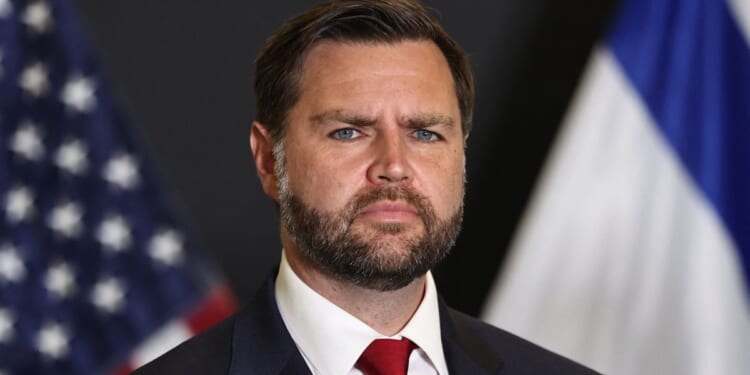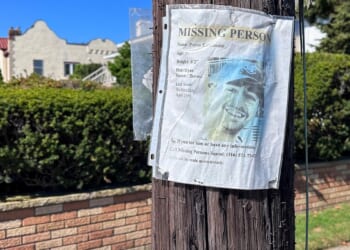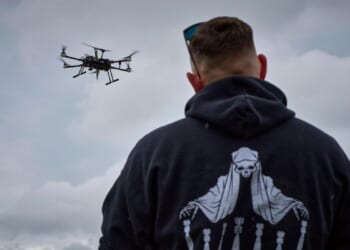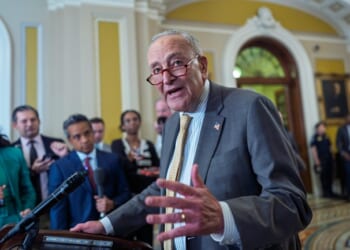In a groundbreaking blend of technology and diplomacy, Vice President JD Vance’s recent visit to Israel from October 21-23 initiated a contemporary perspective on understanding conflict zones.
While meeting Israeli Prime Minister Benjamin Netanyahu to fortify the fragile Gaza ceasefire, Vance donned VR goggles to experience a simulated Gaza, a move that signals a new frontier in how policymakers engage with complex crises.
This high-tech immersion, designed to showcase strategic and humanitarian realities without the risks of a physical visit, sets an excessively high potential precedent for diplomats navigating volatile regions in the digital age and raises provocative questions about whether virtual tools can reshape U.S. foreign policy decision-making: Can virtual simulations re-establish how U.S. leaders navigate the complexities of global crises, or do they risk reducing human suffering to a digital spectacle?
This story, though, seemed to strike a nerve among American politicians.
GOP Sen. Lindsey Graham of South Carolina wrote on X: “I just spoke with Israeli Ambassador to the U.S., @yechielleiter, about the recent vote in the Knesset regarding annexing the West Bank. … He vigorously stressed no offense was meant and reinforced that no major decisions will be made by Israel without cooperation and coordination with the U.S.”
I just spoke with Israeli Ambassador to the U.S., @yechielleiter, about the recent vote in the Knesset regarding annexing the West Bank. He called from the Prime Minister’s office to reassure me that this vote was not intended to be a slight to the U.S. and the position of the… https://t.co/TR0QnWROEn
— Lindsey Graham (@LindseyGrahamSC) October 23, 2025
Speaking at the 45th Annual Night to Honor Israel event, Republican Sen. Ted Cruz of Texas used the occasion to decry rising anti-Semitism on both political flanks, implicitly tying Vance’s visit to a renewed U.S. commitment against such threats.
He said, “About a decade ago, anti-Semitism began rising on the left, and the Democrat Party did nothing.”
About a decade ago, antisemitism began rising on the left, and the Democrat Party did nothing.
But in the last 6 months, we have seen antisemitism rising on the right. We must confront it.
My full remarks at the 45th Annual Night to Honor Israel, here: https://t.co/tqvcRNhZLB pic.twitter.com/Ky6jYmWSU9
— Ted Cruz (@tedcruz) October 22, 2025
He said in further remarks shared online, “But in the last 6 months, we have seen antisemitism rising on the right. We must confront it.”
Cruz’s words positioned the VR tour and Vance’s diplomacy as part of a larger narrative of American resolve.
Vance himself amplified the trip’s themes of hope and resolve in a series of X-posts that bookended his visit.
Upon arrival, he declared, “We have made incredible progress in our efforts toward peace in the Middle East. With the world’s prayers, God’s providence, and the excellent team President Trump has assembled, we will get the job done.”
We have made incredible progress in our efforts toward peace in the Middle East.
With the world’s prayers, God’s providence, and the excellent team President Trump has assembled, we will get the job done. pic.twitter.com/5s5sIABX0q
— JD Vance (@JDVance) October 21, 2025
By departure, after the VR briefing and annexation uproar, he reflected on a poignant stop at Jerusalem’s Church of the Holy Sepulchre: “What an amazing blessing to have visited the site of Christ’s death and resurrection … May the Prince of Peace have mercy on us, and bless our efforts for peace.”
What an amazing blessing to have visited the site of Christ’s death and resurrection. I am immensely grateful to to the Greek, Armenian, and Catholic priests who care for this most sacred of places.
May the Prince of Peace have mercy on us, and bless our efforts for peace. https://t.co/X6CDoxJqOj
— JD Vance (@JDVance) October 23, 2025
These sentiments echoed his news briefing optimism, where he described the ceasefire as “durable” and “going better than expected,” while warning Hamas of dire consequences for non-compliance.
Yet, the VR tour’s novelty has drawn sharper scrutiny from across the aisle. Senate Minority Leader Chuck Schumer, although a vocal advocate for Israel, has remained conspicuously silent on X about Vance’s trip.
However, in a Senate floor speech on Oct. 24, he cautioned against “rushing to digital judgments” in diplomacy, urging the administration to prioritize on-the-ground aid over simulations.
Democratic critics, including House Minority Leader Hakeem Jeffries, have privately expressed concerns that the tech-heavy approach risks alienating Palestinian stakeholders, potentially complicating phase two of Trump’s 20-point peace plan.
Proponents, like Israeli officials who hosted the demo, hail it as a “game-changer” for sharing real-time intel on Gaza’s tunnels and aid routes without endangering VIPs.
Detractors, including aid organisations like Doctors Without Borders, argue it sanitizes the raw devastation: Israeli hostages’ fates and Palestinian deaths reduced to pixels.
In an era where AI briefs presidents and drones map battlefields, Vance’s Gaza goggles may herald a pixelated pivot in policymaking — one that promises safer insights but demands safeguards against virtual detachment.
As the ceasefire teeters, the question remains: Will this digital diplomacy deliver peace or just another layer of simulation?
The views expressed in this opinion article are those of their author and are not necessarily either shared or endorsed by the owners of this website. If you are interested in contributing an Op-Ed to The Western Journal, you can learn about our submission guidelines and process here.
Advertise with The Western Journal and reach millions of highly engaged readers, while supporting our work. Advertise Today.












